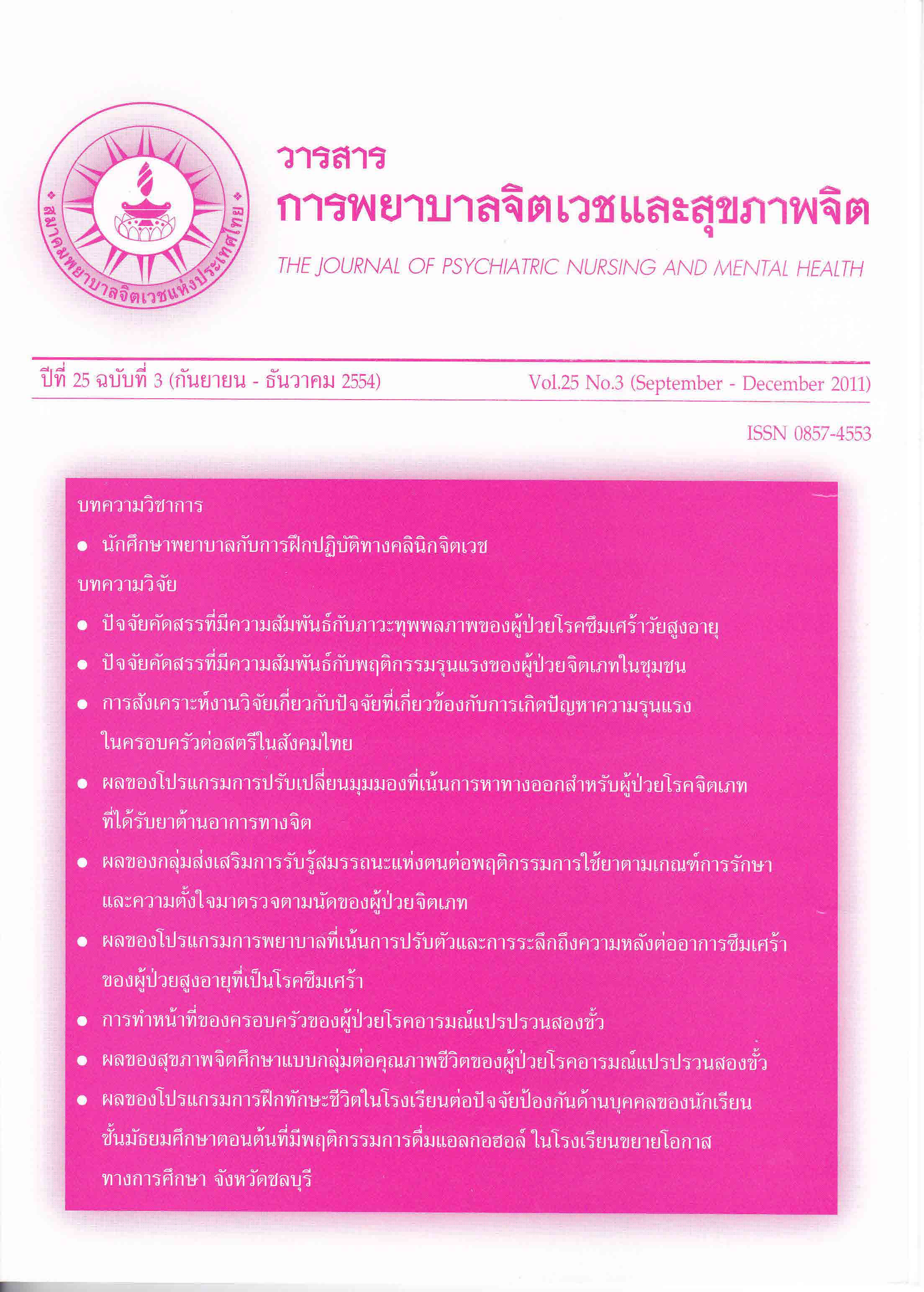การสังเคราะห์งานวิจัยเกี่ยวกับปัจจัยที่เกี่ยวข้องกับการเกิดปัญหาความรุนแรง ในครอบครัวต่อสตรีในสังคมไทย
Main Article Content
บทคัดย่อ
บทคัดย่อ
การศึกษาครั้งนี้มีวัตถุประสงค์เพื่อสังเคราะห์งานวิจัยเกี่ยวกับปัจจัยที่เกี่ยวข้องกับการเกิดปัญหาความรุนแรงในครอบครัวต่อสตรีในสังคมไทย โดยรวบรวมหลักฐานงานวิจัยจากฐานข้อมูลต่างๆ เช่น อิเล็คทรอนิคส์และห้องสมุด มีงานวิจัยที่นำมาศึกษา 21 เรื่อง ผลการศึกษาสามารถสรุปปัจจัยที่เกี่ยวข้องกับการเกิดปัญหาความรุนแรงในครอบครัวต่อสตรีในสังคมไทย ได้เป็น 3 ระดับ คือ 1) ระดับบุคคล ได้แก่ ประสบการณ์ความรุนแรง พฤติกรรมการใช้เครื่องดื่มแอลกอฮอล์ การใช้สารเสพติด การเล่นการพนัน ฐานะทางเศรษฐกิจ บุคลิกภาพ ความเครียด การเจ็บป่วยทางกาย/ จิต อายุ เพศ ระดับการศึกษา อาชีพ และการเข้าร่วมกิจกรรมทางศาสนา 2) ระดับครอบครัว ได้แก่ รายได้ครอบครัว การสื่อสารระหว่างภรรยากับสามี สัมพันธภาพระหว่างภรรยากับสามี การอบรมเลี้ยงดู ประเภทครอบครัว ระยะเวลาสมรส สถานภาพสมรส และจำนวนบุตร และ 3) ระดับชุมชนและสังคม ได้แก่ การยอมรับความรุนแรงของคู่สมรส การยอมรับความรุนแรงจากเพื่อนสนิท/ เพื่อนบ้าน การรับรู้บทบาทหญิงชาย การสนับสนุนทางสังคม และการมีส่วนร่วมทางสังคม
องค์ความรู้ที่ได้จากการศึกษาครั้งนี้สามารถนาไปประยุกต์ใช้ในการพัฒนากระบวนการเฝ้าระวัง คัดกรอง ค้นหา และวางแผนให้การดูแลสตรีที่มีปัญหาความรุนแรงในครอบครัวในสังคมไทย ได้อย่างครอบคลุมและมีประสิทธิภาพมากขึ้น
คำสำคัญ : ความรุนแรงในครอบครัว, ปัจจัย, สตรี
ABSTRACT
The present study aimed at synthesizing research on factors related to domestic violence among women in Thai society. There were 21 research studies recruited from electronic databases and a manual search. The results of the synthesis revealed that the factors related to domestic violence among women in Thai society could be divided into three levels: 1) the Individual level, including experience with violence, alcohol drinking behavior, substance abuse, gambling, economic status, personality, stress, physical sickness or mental health problems, age, gender, educational background, occupation, and participation in religious activities; 2) the Family level, including family income, communication between husband and wife, relationship between husband and wife, upbringing, type of family, duration of marriage, marital status, and number of children; and 3) the Community and society level including couples’ acceptance of violence, close friends’ and neighbors’ acceptance of violence, perceived roles of the genders, social support, and social participation.
The body of knowledge derived from this study could be used to develop a process to monitor, screen, search, and plan for care of women who suffer domestic violence in Thai society more comprehensively and more effectively.
KEY WORDS : Domestic Violence, Factors, Women
Article Details
บทความที่ได้รับการตีพิมพ์แล้ว เป็นลิขสิทธิ์ของสมาคมพยาบาลจิตเวชแห่งประเทศไทย

